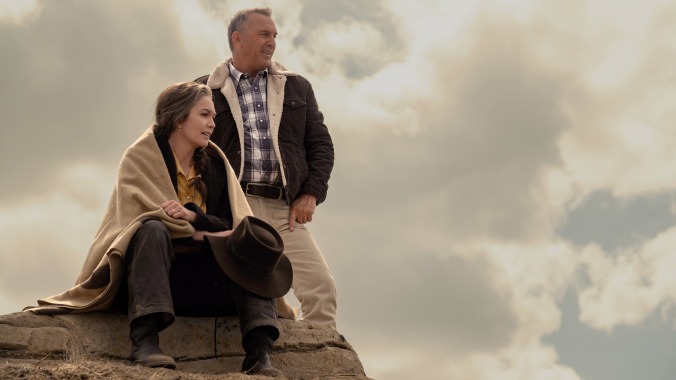Kevin Costner and Diane Lane embark on a Western-ish mission to Let Him Go

Note: The writer of this review watched Let Him Go from home. Before making the decision to see it—or any other film—in a movie theater, please consider the health risks involved. Here’s an interview on the matter with scientific experts.
Back in 1993, when Clint Eastwood and Kevin Costner made their one and only movie together, few could predict that Costner, rather than Eastwood, would go on to become an unofficial keeper of the cinematic Western. While Eastwood has repeatedly flirted with retirement over the years, he’s stayed true to the finality of Unforgiven and left the cowboy hat alone for nearly 30 years. Costner, on the other hand, has become an expert at fitting in one more Western whenever possible. That being said, Let Him Go isn’t a traditional example of the genre. It’s set in the mid-’60s, and contains more quietly strained family melodrama than horses (although there are horses). For that matter, the movie doesn’t really belong to Costner. He’s a laconic sidekick to Diane Lane, in a coupling that bears a passing resemblance to their recent work as Ma and Pa Kent. But there’s no mistaking the movie’s homesteading spirit.
Lane plays Margaret Blackledge, who the movie economically establishes as a doting grandmother, a vaguely disapproving mother-in-law, and a grieving parent in quick succession. The unexpected loss of Margaret’s adult son is compounded when her daughter-in-law Lorna (Kayli Carter) remarries and moves away from the modest Blackledge ranch, taking Margaret’s 3-year-old grandson Jimmy (Bram and Otto Hornung) with her. Shortly thereafter, Margaret witnesses an abusive outburst from Lorna’s new husband Donnie Weboy (Will Brittain), and before she can confront him, the new family blows town in a hurry. Margaret’s husband George (Costner), a retired sheriff, isn’t sure if it’s their place to track down and retrieve Jimmy, but that’s what Margaret insists they do.
Writer-director Thomas Bezucha, adapting a novel by Larry Watson, shows remarkable patience in developing this low-key rescue mission—or maybe he just assumes that he’s courting an older audience who won’t need much prompting to side with Diane Lane and Kevin Costner, but will enjoy extra time with them all the same. As they travel from Montana to North Dakota tracking the mysterious Weboy family, the couple practices their contrasting interrogation styles with various locals. Margaret is both sunnier and more aggressive, while George exhibits taciturn reluctance, dragging his words over the trails of gravel that have formed in Costner’s voice. Meanwhile, the movie prods at Margaret’s strained relationship with Lorna just enough to plausibly deny that it’s a fantasy for grandparents who want their own Taken, centered around the unforgivable crime of cutting short a grandchild’s visit.
Lane also deserves credit for making sure that the scene of little Jimmy being pried from Margaret’s arms is genuinely affecting. Some of this is manipulation: Make sure the kid is especially young and helpless, bring in the abuse angle, and deny any member of Donnie’s clannish family any basic human decency. Yet Let Him Go is also skillfully made, even as it teeters between elegiac post-western restraint and shameless pulp. Sometimes the teetering itself helps sustain the tension: When Margaret and George meet the Weboy’s dirtbag matriarch Blanche, Lesley Manville bites into a dinner-table monologue with a hammy relish that wouldn’t feel out of place on a lesser season of Justified. And it’s a kick to watch decent folk like Costner and Lane react with befuddlement to her smiling affronts.
But Let Him Go mostly lacks the grim humor of a Justified-level blood feud, and sometimes succumbs to flavorless sentiment. Though Costner’s character doesn’t drive the narrative, Bezucha sometimes feels as if he’s taking cues from his star, ensuring that the movie stays square, respectful, and a little dumb. This is a neo-Western in time period, but not necessarily sensibility. As in more traditional Westerns, an American Indian serves as a plot convenience—though here as a soft-spoken ally in the form of Peter (Booboo Stewart), a young man Margaret and George meet on the road.
One key element that keeps Let Him Go from becoming an AARP manifesto of grandparent grievances is its acknowledgment of the physical limitations involved when climbing back in the saddle. George and Margaret may be tough, but they can’t complete their mission with Liam Neeson-style efficiency. So Bezucha’s sensitivity, seen in his otherwise incongruous previous features The Family Stone and Monte Carlo, ultimately wins the day. While it’s hard to shake the awareness that the whole movie exists to set up violent catharsis, it’s hard to deny that it has just enough sadness and regret to back it up.